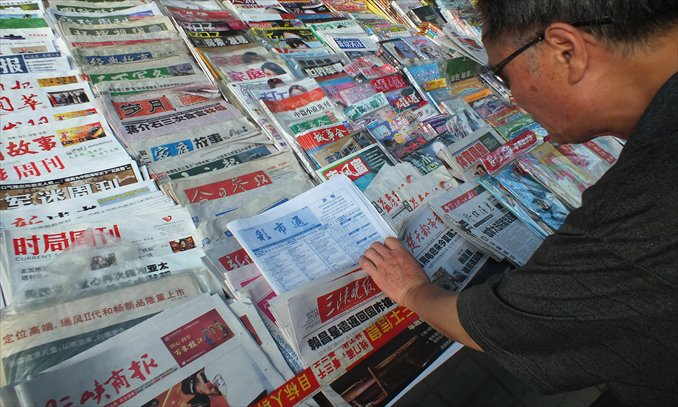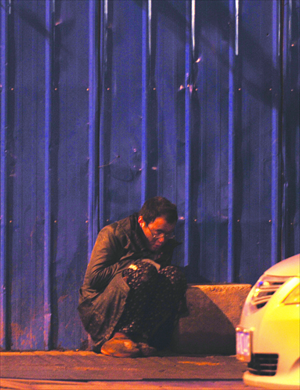Gotcha Journalism


On the freezing night of January 7, a deaf and mute homeless man was severely beaten by employees of a government-run rescue shelter in Changsha, capital city of Central China's Hunan Province.
The nightmare started around 10:30 pm when the police who had sent the young man to the shelter left.
After being unresponsive to inquiries about his name and potential home address, one member of staff approached him and held his arms while two others pushed him around and knocked him to the ground.
In truth, this pathetic tale happened to a journalist in disguise, with the Changsha-based Sanxiang Metropolis Daily, named Dai Peng, who was trying to uncover the real situation about the shelter since many homeless people said they were afraid of going there.
In the article drawn from his experiences there, Dai claimed he was not released even after he pleaded that he would leave the shelter at once. One employee pressed his knees against Dai's head, making it difficult for him to breathe and close to passing out, said the report.
Dai was allowed to leave after the shelter confirmed with his father that he was a journalist rather than a mentally ill man.
The report published on January 9 triggered widespread outrage. The shelter was dubbed as being hellish and its staff accused of being inhumane. Other media soon picked up the rallying cry and turned on the shelter.
While the heroic reporter laid out this tragic story for all to see Weibo, the shelter, refusing to remain a sitting duck, prepared its counter-offensive.
Dramatic twist
The Changsha civil affairs bureau, which oversees the rescue shelter, held a press conference under intense criticism and flatly denied the shelter's employees assaulted Dai. The next day, the rescue shelter opened a Weibo account, further seeking to clarify the "misunderstanding."
According to a statement the civil affairs bureau provided to the Global Times, the two parties clashed when a psychiatrist found something hiding in Dai's pocket which the journalist refused to show.
The security guards worried that he was a mental patient prone to violence and took "temporary restraining measures," it explained, adding that Dai fell to the floor during a scramble for the suspicious item, which turned out to be an audio recorder.
The story took a new twist when the rescue shelter uploaded a 128-minute video clip with no audio on Weibo on January 11, revealing the entire scene from Dai's arrival to his departure. After watching the video, which seemed to show no group assault taking place, many Web users rounded on the newspaper itself, accusing it of blowing up the facts out of proportion.
"If the purpose of the undercover reporting was really to experience the welcome of a rescue shelter as Dai's boss said, why did the report overlook some details, such as a member of staff giving Dai an overcoat?" said Zheng, one media practitioner in Shenyang, Liaoning Province, who has been closely following this matter.
In his controversial report, Dai also revealed that a pitiful elderly man was tied to a stretcher and "disappeared after an hour." The shelter explained that the man had been restrained upon arriving after allegedly biting a police officer but Dai's report didn't mention that he was later transferred to a mental hospital for treatment.
More and more Internet users, angry at having been seemingly duped, swarmed the newspaper's Weibo account, requiring it to make a public apology for spreading "false news."
Yin Xingfa, a publicity officer with the Changsha civil affairs bureau, told the Global Times that an investigation has been launched into the incident. He admitted that "our rescue efforts are not flawless, and we will try to make improvements in the future," he said.
"It's pathetic for a media outlet to resort to entrapment, yet it is even more lamentable for other media to try and shield such misconduct," said Zheng.
Untruths upon untruths
The drama has inevitably led to people talking about the rights and wrong of such undercover reporting that put journalists at the center of news stories.
Under mounting accusations, the Sanxiang Metropolis Daily explained on January 12 via its Weibo that such techniques were commonplace among Chinese media, and had led to the discovery of many scandals such as those concerning gutter oil and melamine-contaminated milk powder. It said these methods were perfectly acceptable as long as the reporters did not violate any laws.
"This way of reporting may be common, but the premise is that a journalist should present the truth faithfully and not present premeditated perspectives," said Zheng.
In August 2011, Cui Songwang, a journalist with Henan TV, disguised himself as a mentally ill person and affected weird mannerisms, such as eating other people' leftovers. He was eventually sold to an illegal brick factory where he uncovered that the factory owner abused mentally ill laborers and assisted the police in rescuing over 30 victims after managing to escape. His report is widely seen as a successful undercover interview.
"Such interviews are strictly limited in Western countries, and can only be used when key information is inaccessible through normal channels and the matter concerns the public interest," said Liu Xiaoying, a professor of journalism with the Communication University of China. "But such restrictions don't exist in China."
Liu stressed that to present an objective news story, journalists should have voices from all parties involved. But in recent years, biased or wholly fake articles have constantly emerged, gradually weakening the reputation of the entire industry.
In July 2007, Beijing TV disclosed in an undercover report that many steamed stuffed buns, or baozi, mixed cardboards in their fillings. The scandal soon aroused wide attention, yet the story turned out to be totally fabricated and the guilty reporter was sentenced to a year in prison.
"It's obvious that given fierce market competition, some media outlets try to boost their circulation or ratings with eye-catching reports, facilitating the boom of untrue news," said Liu.
On October 4, 2012, a Nanjing-based newspaper reported that a large number of people lined up in a deer farm to drink deer blood during the National Day holiday, illustrating the story with a picture showing a man enjoying this "nutrient." However, this sensational news was also found to be invented with the accusatory picture having been a set-up.
In recent years, the nationwide reform in cultural industry has thrust traditional media into an era of far more fierce competition. According to official data, a total of 5,000 newspaper and periodicals are expected to be reduced between 2011 and 2015. Currently, there are about 2,000 newspaper and 10,000 periodicals nationwide.
"Nowadays, the Internet has become an important platform for the creation and propagation of fake news," said Bai Hongyi, an assistant researcher with the Journalism Research Institute, Shanghai Academy of Social Sciences. He recently published a research report on fake news in 2012 in the monthly Journalism Review.
"Traditional media sources have been greatly challenged to remain timely and ground-breaking, stimulating some journalists to largely rely on new media such as Weibo to produce news stories without fact-checking," Bai told the Global Times, noting that this trend would only worsen the reputation of traditional media and serve to further marginalize them.
During this tumult that has brought negative impacts to both government departments and the newspaper, Yang Keming, a Changsha resident, is one of the few that has maintained a skeptical attitude in pursuit of the truth.
"I was also very angry at the rescue shelter when I first read the newspaper, but I realized that we needed to hear voices from both sides after reading a post from the son of the shelter's director who provided another story," Yang told the Global Times.
"I think a majority of Web users lack independent thinking and are easily excited. If the media was proved to have unfaithfully reported an incident, isn't that intentionally stirring up trouble?"
Scared officials
"It's time for the government to change their working style by being transparent and consciously accepting supervision from the media," said Liu. It is undeniable that media attempts to interview government departments have long been impeded, sometimes even violently.
Liu also added that the media should also be cautious about how to use their platform and avoid wielding deliberately reporting as a weapon.
"I used to talk to local officials who told me that they were afraid of facing the media, which they said would exaggerate or distort their words," said Liu. "This will only lead to a vicious circle."
Liu Binjie, director of the General Administration of Press and Publication, said on January 4 that the administration would further regulate media practitioners and seek to solve problems including exaggerated news and paid news.
Bai said that beyond being a source for untrue news, the Internet has played its role as a platform for clarification, as Web users can judge the authenticity of a news report based on numerous complementary information available online.
In November, a Zhejiang-based newspaper published a front-page picture about female soldiers studying documents about the "spirit" of the 18th CPC National Congress, which was soon exposed by Web users as a set-up, forcing the paper into an apology.
A third-party arbitration platform to determine the authenticity of a report when disputes arise should be established, Liu suggested.
"The credibility of local governments has been completely overthrown. If the media continue to tarnish their public trust with rumors, who could we believe in the future?"one Weibo user lamented.